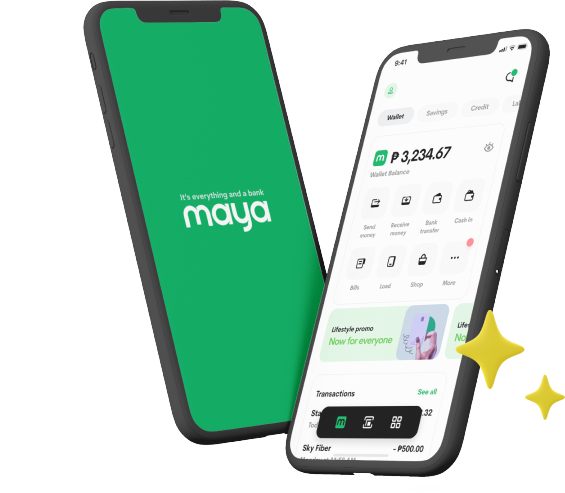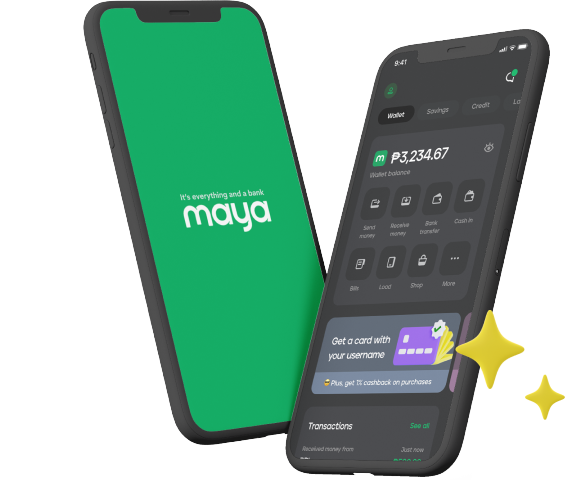Credit card scams, while not a new concept, are evolving with the times. In the past, malicious entities must first skim or acquire their target’s credit card to be able to access their account. That is no longer the case in the digital age, especially with the proliferation of online payment channels. Credit card scammers in the Philippines continue to use skimming and data theft to take advantage of their victims, but they have also significantly expanded their repertoire so they can exploit the vulnerabilities of digital payment systems.
To protect our credit card users from scammers as well as adhere to safety and security requirements, Maya implements world-class security measures. We comply with the Payment Card Industry Data Security Standard (PCI DSS), which is widely recognized and upheld by major credit card brands and financial institutions around the world. Transactions that occur within our payment ecosystem also require two-factor authentication (2FA). These contribute to ensuring that Maya users have access to secure online credit card transactions. Even when wielding the safest credit card, however, users like you still need to do your part to protect yourselves. Key to this is having a clear idea of how to ensure safe transactions and familiarizing yourself with the common scams that target local credit card users. Here are the credit card cons that you should be able to recognize and how you can avoid them.
Phishing Scams
In the digital age, fraudsters typically carry out phishing scams by sending emails or text messages that appear to be from legitimate sources, such as banks or credit card companies. These messages often contain links to fake websites that ask for personal information, like your birthday, complete name, credit card number, passwords, and PINs. It’s a good habit to always verify the sender's contact details before clicking on any links you receive through email, text, or even instant messaging apps. The bottom line is to never provide personal information through email or text message. Should you have any doubt about a message you receive, reach out to your bank directly using the contact information provided on their official website.
Skimming
Despite being an old trick, skimming continues to be an issue for credit card users who prefer to engage in in-store transactions. It involves the use of skimming devices placed on ATMs or point-of-sale (POS) terminals to capture credit card information during a transaction. Fraudsters, in turn, use the information that the skimming devices capture to create counterfeit cards or make online purchases.
Avoid falling to skimming scams by inspecting ATMs and POS terminals before using them and specifically looking for any unusual devices or attachments. It’s also safer to use ATMs located in well-lit, secure areas, such as bank branches, and remember to cover the keypad when entering your PIN to prevent hidden cameras from capturing it.
Card Not Present (CNP) Fraud
CNP fraud may not be as well-known as skimming and phishing, but it’s currently one of the most common types of cybercrime in the Philippines. It occurs when a fraudster uses your credit card information to make online or over-the-phone purchases without needing the physical card. To determine if you have fallen victim to CNP fraud, you need to regularly monitor your credit card statements. This will help you discover if unauthorized transactions have been made using your details. This way, you can take steps to secure your credit card information.
Fake Credit Card Offers
Fraudsters can also send fake credit card offers via email, mail, or phone calls with the promise of low interest rates or high credit limits. These offers are designed to collect personal information, which is then used for fraudulent activities. To avoid falling for fake credit card offers, verify the legitimacy of any offers you receive by contacting the bank or credit card company directly. Remember: do not provide personal information in response to unsolicited offers, and be wary of offers that seem too good to be true.
Online Shopping Scams
There are also tech-savvy scammers who create fraudulent websites or social media ads in an effort to lure you into making purchases on these platforms using your credit card. The scammers then either steal your card information or never deliver the purchased items after getting your payment. You can avoid these issues by choosing to shop from reputable websites and verified sellers. Look for security features such as the "https://" in the URL to ensure that the website is secure. It would also help to check out the store’s reviews to see the experiences of the people who bought from the shop.
What Should You Do If You Suspect That You Have Been Targeted by a Credit Card Scam?
If you suspect that you have fallen victim to a credit card scam, act quickly to minimize the damage. Let’s say you lost your card or it was damaged, your credit card information has been compromised, or an unauthorized transaction has been made using your card. You can immediately contact your credit card issuer to report the suspicious activity and request that your card be blocked to prevent further unauthorized transactions.
If you’re a Maya Credit Card user, you can cancel your credit card using the Maya app. Follow these steps to cancel your existing card and start the process of getting a replacement:
- Go to “Cards” and select your credit card
- Tap the gear icon to open your card settings
- Select “Card Security,” then choose “Replace This card”
- Select a reason for the replacement and choose “Confirm” when prompted
- Once your card is canceled, you can tap “Order a New Card” to get a replacement
It’s also a must to contact Maya immediately and report the incident via the 24/7 in-app support.
Is Maya credit card safe? Yes, very much so. But just like other credit cards, you need to play your part in ensuring that your card details are kept secure. The convenience of using credit cards shouldn't make you disregard your safety when using them in physical or online transactions. By being vigilant and taking proactive measures, you can protect yourself from these common scams and enjoy the benefits of credit cards without falling victim to fraud.
You might also like
These Stories on Maya Bank





